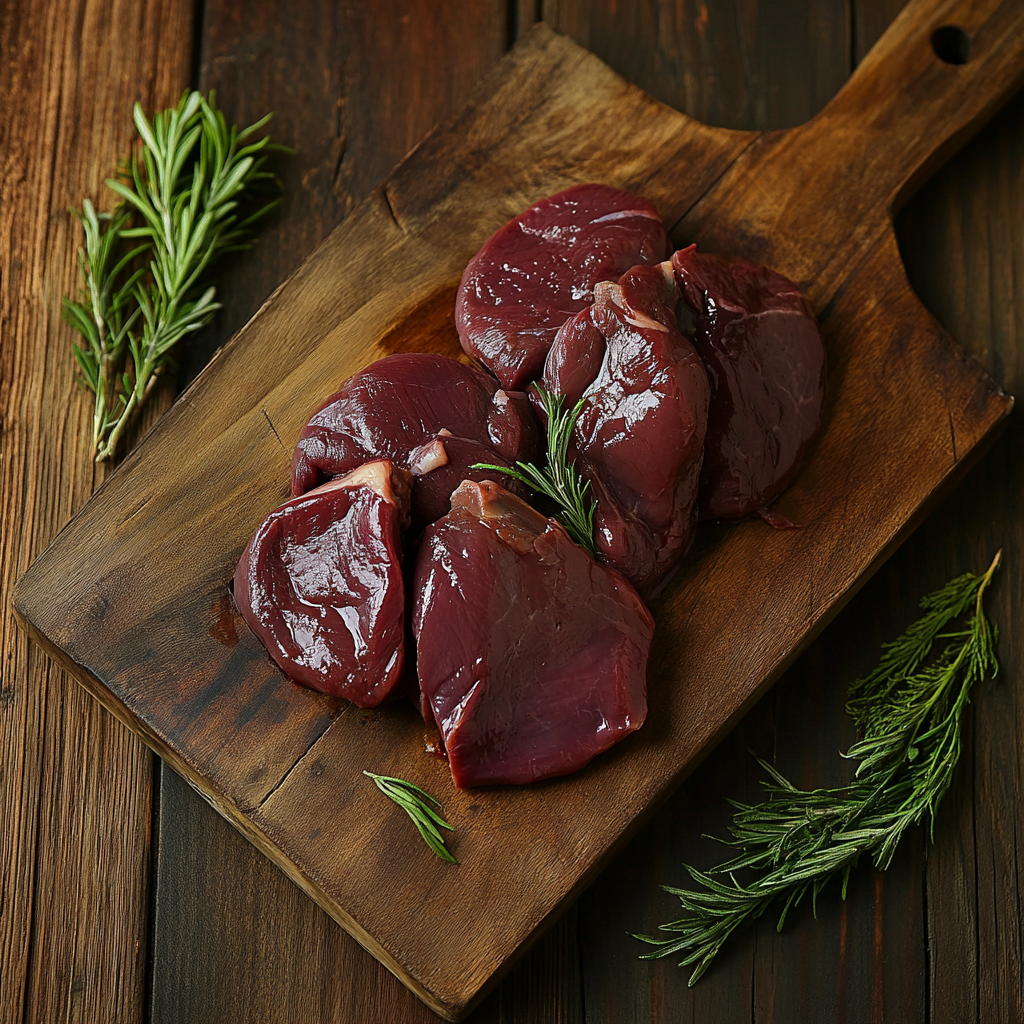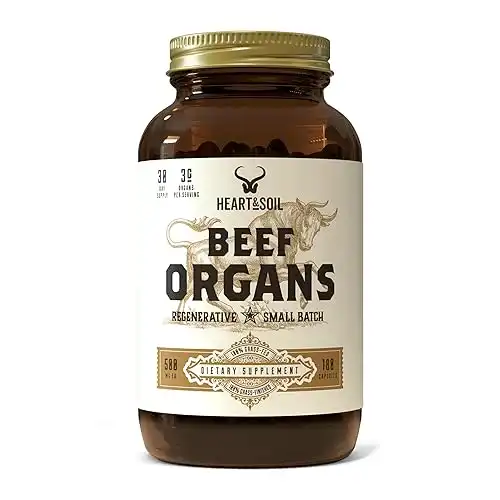Beef Organs – Are Heart & Liver Nature’s Ultimate Multivitamin?
Introduction Beef organs, including heart, liver, and more “manly” organs, have become popular in recent years as part of…

Disclosure: As an Amazon Associate, this site earns from qualifying purchases. Thank you!
Introduction
Beef organs, including heart, liver, and more “manly” organs, have become popular in recent years as part of the overall increases in a return to more natural and traditional health focused diets. Organs are packed full of vital nutrients and peptides to support overall health, vitality and energy. Influencers ranging from the Liver King to Paul Saladino, MD are advocates of adding more natural or “ancestral” elements to our modern lives with healthy practices such as reducing plastic use and eating whole, unprocessed foods.
What Is Liver?
Liver is a type of organ meat derived from the largest internal organ in the body, present in all vertebrates. It performs numerous vital functions, including filtering blood, eliminating toxins, and producing bile—a substance that aids in fat digestion and waste removal—among hundreds of other roles.
Liver from various animals is consumed globally. You might come across options like beef, calf, chicken, pork, lamb, goose, or cod liver at your local butcher, seafood shop, or supermarket. Known for its bold flavor and distinctive texture, liver tends to divide opinions—some people enjoy it immensely, while others find it unappealing.
The Nutritional Powerhouse of Beef Organs
Traditional cultures prized organ meats as sacred foods, often reserved for warriors, pregnant women, or tribal leaders due to their dense nutrient profiles. Unlike muscle meats (like steak or chicken breast), organs like heart and liver offer a concentrated blend of vitamins, minerals, and unique compounds that are hard to find elsewhere in the modern diet. But what exactly makes them stand out? Let’s break it down.
Beef Liver: The Vitamin Vault
Beef liver is often dubbed “nature’s multivitamin” for good reason. Just a 3-ounce serving provides:
- Vitamin A (Retinol): 16,000 IU. Over 700% of the Recommended Daily Allowance (RDA), crucial for vision, immune function, and skin health. Unlike plant-based beta-carotene, retinol is pre-formed and highly bioavailable.
- Vitamin B12: 6mcg. More than 1,000% of the RDA, supporting energy production, brain health, and red blood cell formation.
- Iron: 5mg. A hefty dose of heme iron, the type most easily absorbed by the body, making it a go-to for combating anemia.
- Copper 1mg, Riboflavin, and Folate: Essential for metabolism, hormone balance, and cellular repair.
Beyond vitamins and minerals, liver contains unique peptides like cytochrome P450, which supports detoxification, and coenzyme Q10 (CoQ10), a powerful antioxidant linked to heart health.
Beef Heart: The Energy Engine
While liver steals the spotlight, beef heart is another vitamin packed organ meat. It’s leaner than liver but still nutrient-dense, offering:
- CoQ10: Found in higher concentrations than in most foods, CoQ10 supports mitochondrial function—the powerhouse of your cells—and cardiovascular health.
- B Vitamins: Particularly rich in B12 and B6, which aid energy metabolism and reduce fatigue.
- Iron and Zinc: Vital for oxygen transport and immune support.
- Collagen and Elastin: Structural proteins that promote joint and skin health.
Heart’s mild flavor and meaty texture make it an easier entry point for organ newbies compared to the intense taste of liver.
Addressing the Ick Factor
Let’s be honest—eating organs isn’t for everyone at first glance. The texture, taste, or even the idea can be off-putting. But preparation matters. Liver can be soaked in milk to mellow its flavor, blended into patties, or even taken as desiccated capsules for the squeamish. Heart, with its steak-like consistency, can be grilled or slow-cooked into stews. Small doses—like adding a few ounces to your weekly routine—can yield benefits without overwhelming your palate.
Alternatively, beef organs in capsule form are readily available, providing the same bioavailable elements in an easy to consume prepared manner.
Potential Downsides
No food is perfect. Liver’s sky-high vitamin A content, while a strength, can lead to hypervitaminosis A if overconsumed (think multiple ounces daily for weeks). Those with gout may need to moderate intake due to purines in organs. And sourcing matters—grass-fed, pasture-raised beef offers cleaner, more nutrient-rich organs than factory-farmed alternatives.
Dr. Paul Saladino on Organ Meats
The inspiration for this article is from Dr. Saladino, a pioneer of optimizing our nutrition and reducing our modern environmental toxins. Here’s a video from him discussing liver.
Conclusion: Nature’s Ultimate Multivitamin?
Beef heart and liver aren’t just relics of the past—they’re nutritional powerhouses that rival, and often surpass, modern supplements. Packed with bioavailable vitamins, minerals, and unique compounds, they offer a compelling case for reclaiming ancestral eating habits. Whether you’re chasing vitality, energy, or simply better health, a small serving of these organs might just be the missing piece in your diet. So, are they nature’s ultimate multivitamin? The evidence—and our ancestors—suggest yes.
Where to get Organ Meats?
You can find organ meat from a variety of sources depending on your location and preferences. Local butchers are often a great starting point, as they may carry cuts like liver, heart, or kidneys. Farmers markets are another option, offering organ meats from pasture-raised or grass-fed animals, often directly from the producers. Many grocery stores, especially those with a proper meat department, stock common organ meats like chicken livers, and some higher-end or specialty stores might have a broader selection. Ethnic markets—such as Asian, Middle Eastern, or Mexican grocers—frequently carry organ meats at lower prices, though they may not always be grass-fed.
For convenience or variety, online retailers are a solid choice. Companies like US Wellness Meats, Seven Sons Farms, and White Oak Pastures deliver grass-fed and regeneratively raised organ meats—think beef liver, lamb heart, or bison kidney—straight to your door. These often come with detailed info on sourcing, like 100% grass-fed or no hormones.
As an alternative to sourcing and eating fresh organ meats, supplements can be a convenient way to get similar nutrients without the hassle of cooking or finding a reliable supply. These supplements are typically made from desiccated (dried) organ tissues—like liver, heart, kidney, or spleen—sourced from animals, often beef, and processed into capsules or powders. The idea is to mimic the nutritional profile of fresh organs, which are packed with bioavailable vitamins and minerals like A, B12, iron, and CoQ10, but in a form that’s easier to stomach if you’re not a fan of the taste or texture.
This beef organ supplement contains the nutritional goodness of a blend of organs but without the messy sourcing and prep needed to prepare raw organs.







